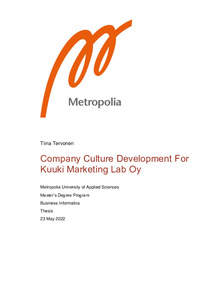Company Culture Development for Kuuki Marketing Lab Oy
Tervonen, Tiina (2022)
Tervonen, Tiina
2022
All rights reserved. This publication is copyrighted. You may download, display and print it for Your own personal use. Commercial use is prohibited.
Julkaisun pysyvä osoite on
https://urn.fi/URN:NBN:fi:amk-2022052812712
https://urn.fi/URN:NBN:fi:amk-2022052812712
Tiivistelmä
The objective for this thesis was to identify areas within the company culture that need improvement or development, and to create competitive edge with a unique company culture in the recruiting market for the case company, Kuuki Marketing Lab Oy.
This thesis utilized qualitative research methods, a survey and dicussions, observations, and internal document analysis. The thesis started with the theoretical framework that focused on the topics of company culture, role of company culture for organizations, elements of company culture, impacts of company culture on the organization and its employees.
The analysis of the current company culture was conducted by using the OCAI (Organizational Culture Assessment Instrument), developed by Kim S. Cameron and Robert E. Quinn. This instrument defines different culture types: clan, adhocratic, hierarchal and market. By scoring statements for the current and preferred status perspectives, the results showed which culture type is currently the most dominant in the organization. The results showed that the differences between the preferred and current scorings were quite small, and the clan culture is the most preferred culture in Kuuki. Therefore, the analysis identified that there was no urgency or pressure to to make any major change. A more significant difference between the preferred and current state was revealed among the employees’ with 1-2 working years´ experience. These employees preferred more hierarchal culture. Based on these differences, the proposal for enhancing the work satisfaction and improving profitability was created.
The proposal suggests the new ways of enhancing team building, motivation, rewarding, personal development, developing services and sales, and project management. These new methods can create a competitive edge for the company in the recruitment market in the long term.
This thesis utilized qualitative research methods, a survey and dicussions, observations, and internal document analysis. The thesis started with the theoretical framework that focused on the topics of company culture, role of company culture for organizations, elements of company culture, impacts of company culture on the organization and its employees.
The analysis of the current company culture was conducted by using the OCAI (Organizational Culture Assessment Instrument), developed by Kim S. Cameron and Robert E. Quinn. This instrument defines different culture types: clan, adhocratic, hierarchal and market. By scoring statements for the current and preferred status perspectives, the results showed which culture type is currently the most dominant in the organization. The results showed that the differences between the preferred and current scorings were quite small, and the clan culture is the most preferred culture in Kuuki. Therefore, the analysis identified that there was no urgency or pressure to to make any major change. A more significant difference between the preferred and current state was revealed among the employees’ with 1-2 working years´ experience. These employees preferred more hierarchal culture. Based on these differences, the proposal for enhancing the work satisfaction and improving profitability was created.
The proposal suggests the new ways of enhancing team building, motivation, rewarding, personal development, developing services and sales, and project management. These new methods can create a competitive edge for the company in the recruitment market in the long term.
